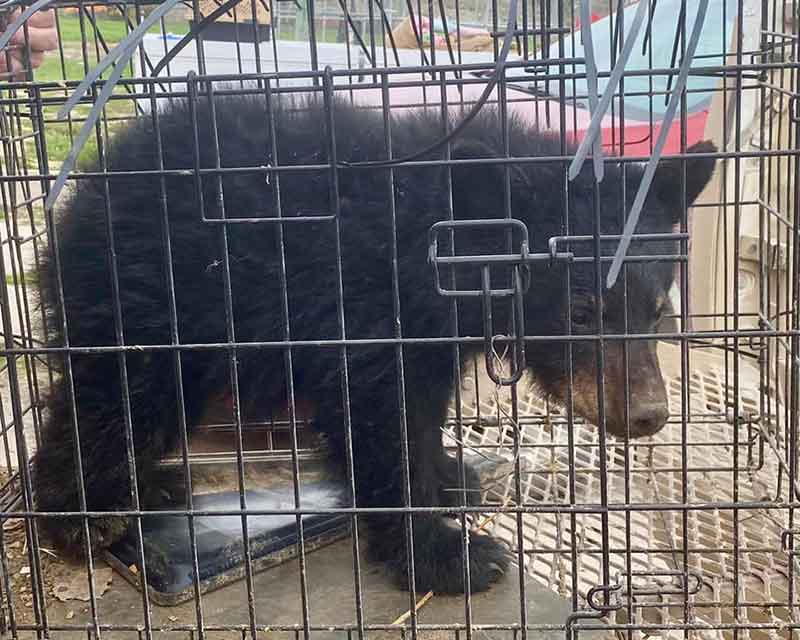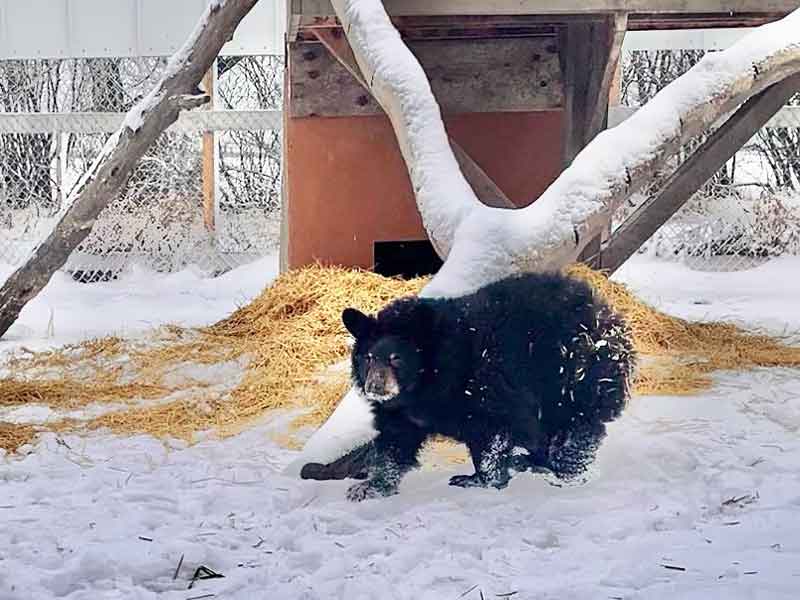Black Bear Rescue Manitoba looking for volunteers
Manitoba’s only bear rehabilitation centre experienced a busy winter with more cubs than usual at the Rockwood-area facility.
Judy and Roger Stearns run Black Bear Rescue Manitoba, which cares for orphaned bear cubs before returning them to the wild.
Normally, cubs arrive in the spring and stay with them until the fall when they’re released. However, this year five cubs overwintered with them.
“This is not the norm for us. We rarely have bears over the winter,” Judy Stearns said.
“We had five bears arrive late in the season and they couldn’t be released, so they spent the winter with us. They’re yearlings now — they’re no longer cubs.”
They’ll likely be released in late June to early July, and the reason for that timing is threefold.
““There is more abundant natural food for bears by then, and we want to make sure that any backcountry areas or trails that we’re going down are dry. Sometimes it’s very remote rugged terrain and we have to go by quad,” Stearns said.
“Also, we always have to wait until the spring bear hunt is over because we don’t think it’s fair to let them go during hunting season.”
They name the cubs alphabetically, and they were at “Z” when two eight-month-old sister cubs arrived in the early fall. Named Zayla and Zsa Zsa, the duo was brought down from a tree by a conservation officer in the Gypsumville area. The fate of their mother is unknown, but they were unlikely to make it through the winter on their own.
Soon after, another cub arrived from the Falcon Lake area, where he was seen hiding in cottage yards with his mother nowhere in sight. He received the name Ace in honour of radio personality Ace Burpee, who is a volunteer and team member at the animal rescue.
The little cub had a fractured leg and underwent surgery at Transcona Vet Hospital. He also had a deep wound near the break that required ongoing monitoring and attention by the experts from Woodlands Vet Clinic.
In mid-October a cub arrived from the Oakbank area where Natural Resources staff retrieved her from a culvert. The cub was named Blueberry in recognition of one of her favourite foods. At first, Blueberry was shaking and unable to stand.
“She was very weak and thin and she struggled even to eat,” Stearns said. “We weren’t sure if she was going to recover or not, but she’s very slowly getting better all the time.”
A fifth cub known as Chester arrived near the end of October from Minitonas, where he had probably been on his own for a while. Again, the fate of his mother is unknown, although human activity is the main cause of cubs being orphaned.
In early December, Zayla and Zsa Zsa began hibernating for the winter in a wooden den house filled with straw. Soon after, Chester began hibernating in early January. The sisters are together in one den house while Chester in his own den house, all within the same enclosure on the Stearns’ property.
“They haven’t budged. They’re completely, fully hibernating. It’s amazing. They don’t eat or drink or poop. Their body just slows right down,” Stearns said.
“In Manitoba, bears in the wild generally emerge from their dens in April, although it could be late March if it’s warm or it could even be early May, especially if it’s colder with more snow. It all depends every year on weather and the snow.”
Meanwhile, Ace and Blueberry are neighbours who have been awake for the winter. Until January, they stayed in an indoor enclosure, which Stearns cleaned daily. Now that they’ve moved outside, their upkeep is less labour-intensive since they only need cleaning and to have their food and water refilled every three or four days. Every enclosure is monitored via security cameras.
In early summer, the five cubs will be released in a remote location far away from humans and busy roads.
“We take them as remote as we can,” Stearns said. “We are licensed by and work in conjunction with the Province of Manitoba so they approve all the release locations. We keep it a very hidden secret where these bears are going.”
At the same time, more young bear cubs could arrive at the facility in coming weeks.
“The norm for bear rehab starts in April after the mothers come out of the den with her cubs and she confronts some sort of danger and is killed. However, we’re finding very often that den disturbances frighten the mother and she abandons her cubs, so we get them when they’re still in the den prior to April,” Stearns said.
“We could get a phone call today saying that very young orphaned cubs are coming in. We never know. It’s a very hard thing to plan for.”
It’s also difficult to determine how many cubs will arrive, since the numbers aren’t consistent year after year, ranging from three to 32 cubs annually since they opened in 2018.
“It’s very unpredictable,” she said. “We’re the only bear rehab facility in Manitoba and we cover the entire province for any orphaned black bear cubs so they can come from anywhere.”
Black Bear Rescue Manitoba is a registered charity that runs entirely on donations without government funding.
They gratefully accept monetary contributions, as well as donations of much-needed supplies such as paper towels, straw brooms, wheelbarrows, Beco brand pet bowls and plush non-knit baby blankets. They could also use plain oat or rice baby cereal as well as gift cards to buy perishables like yogurt for the cubs.
Also, if anyone has a reliable second-hand quad, Stearns said it would be useful for transporting the cubs on rough terrain.
The bear rescue is also in need of a few dedicated volunteers who live nearby.
“We would like to create a list of nearby volunteers who could be on standby if we get in some little ones that need to be bottle-fed around the clock. Animal-handling experience would be preferred but we would always train. You just have to have a steady hand and a good eye to do milk measurements,” Stearns said.
“It would be a daily thing from now until early May if we get cubs in. They need to be fed every few hours around the clock, so it’s a lot of work. If someone lives nearby, they could just pop in every day for an hour or two and help with the bottle-feeding of little wee bears. They’ve got to be committed to come five or six days a week. It’s a totally unique fun experience.”
For more information about volunteering or making a donation, email Black Bear Rescue Manitoba at emailus@mts.net.
To keep up to date on the bear cubs, and to view adorable photos, follow the organization on Facebook and Instagram.
Tribune Photos Submitted
Chester arrived on Oct. 24 weighing 21 lbs. and was 73 lbs. before he denned on Jan. 2 for the remainder of the winter

